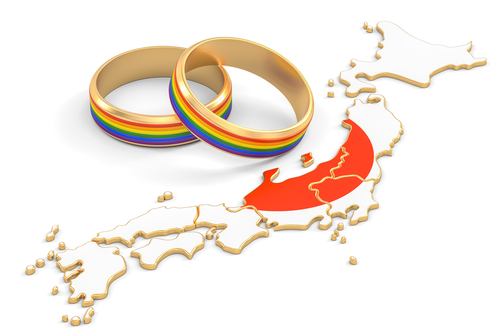Why Is Japan Behind on Marriage Equality?

As the United States anxiously awaits a final ruling on reproductive rights from its Supreme Court, Japan is reeling from a devastating decision on marriage equality from a district court in Osaka.
The Osaka District Court recently ruled against three same-sex couples and declared that the island nation’s current ban on marriage equality doesn’t violate its constitution.
Japan is a liberal democracy with a highly advanced economy. The country’s failure to ensure marriage equality makes it unique among similarly developed nations.
Following a favorable ruling from a local court in Sapporo, activists had initially hoped that a victory in Osaka would pressure the government into pushing for guaranteed marriage equality. Still, for now, justice seems to have been delayed.
Marriage Equality in Japan
The story of marriage equality in Japan is a complicated one. Currently, it’s the sole member of the G7 that does not legally recognize same-sex marriages or civil unions. Including countries like the United States, Canada, and the United Kingdom, G7 nations are generally understood to value human rights.
Public opinion in Japan highlights the divergence between Japan’s status as a developed nation and its failure to guarantee all the right to marry. Compared to its Western counterparts, Japanese culture is understood to be less hostile toward its queer communities. Additionally, an overwhelming percentage of its population supports marriage equality.
So how does one make sense of the disparity between the legal system and public opinion? Some legal scholars argue that the answer can be found in Japan’s constitution.
Article 24
Ratified in 1947, the Constitution of Japan outlines its legal framework for marriage in Article 24. Article 24 states that marriage is only legal by the “mutual consent of both sexes” and makes note of the “equal rights of husband and wife”.
Some argue that the verbiage in Japan’s constitution was likely not intended to prohibit same-sex couples to get married. Prior to the Second World War, arranged marriages were the dominant form of marriage in Japan. Evidence suggests Article 24 was designed to protect the autonomy of the betrothed, not to discriminate against same-sex couples.
Still, some elected officials in Japan favor a literal interpretation of the Constitution. For example, two-time Prime Minister and conservative hardliner Shinzo Abe maintained that the Japanese Constitution never intended to include same-sex couples. He argued that any move to do so would need to be very carefully considered.
While the Constitution remains unchanged, many jurisdictions in Japan still allow for symbolic marriages. Additionally, when a same-sex couple includes a Japanese national whose spouse is from a country where same-sex marriage is recognized, the two are considered legally married.
The Future of Marriage Equality
Stories like these are a reminder that marriage equality must be actively defended and cannot be taken for granted. While local activists are certain to keep fighting, there is a glimmer of hope in the Osaka court ruling.
While the ruling maintained that a ban on same-sex marriage is constitutional given the verbiage, the judges left the door open for change. The official ruling stated that “it is necessary to realize the benefits of same-sex marriage…through official recognition.”
Progress and change are within reach for Japan. One can only hope that this most recent setback mobilizes people of all kinds to make their voices heard going forward. The joy of marriage is too sweet and sacred to be denied any longer. Human rights seem to be under attack all across the world. During times like these, a victory in Japan is a victory for all.














